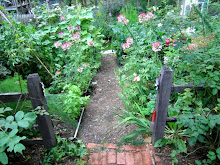As a part of Blog Action Day 2008 on Poverty, here are three thoughts:
1. Natural Poverty. Least importantly, but most related to gardening, I believe that there is a natural poverty related to our increasing disconnection from nature. From Last Child in the Woods by Richard Louv:
"Within the space of a few decades, the way children understand and experience nature has changed radically...Today, kids are aware of the global threats to the environment--but their physical contact, their intimacy with nature, is fading..."
2. Material Poverty. Most immediately, material poverty is increasing in all of our communities, which is particularly hurting the poorest of the poor. Our priest has noted that our local food pantries which are typically well stocked all week are currently running out of food on Mondays. His direction to us? Come to church each Sunday with a donation of food. In addition, two great organizations to support which serve the poorest of the poor in the New York-New Jersey and many other areas around the world are:
a. Franciscan Friars of the Renewal
b. Missionaries of Charity
3. Moral Poverty. As a big fan of Russian literature, I read with great interest the August obituaries written in memory of Alexandr Solzhenitsen. All mentioned the critique of the West delivered at Harvard on June 8, 1978. From the address:
"However, in early democracies, as in American democracy at the time of its birth, all individual human rights were granted because man is God's creature. That is, freedom was given to the individual conditionally, in the assumption of his constant religious responsibility. Such was the heritage of the preceding thousand years. Two hundred or even fifty years ago, it would have seemed quite impossible, in America, that an individual could be granted boundless freedom simply for the satisfaction of his instincts or whims.
Subsequently, however, all such limitations were discarded everywhere in the West; a total liberation occurred from the moral heritage of Christian centuries with their great reserves of mercy and sacrifice. State systems were becoming increasingly and totally materialistic. The West ended up by truly enforcing human rights, sometimes even excessively, but man's sense of responsibility to God and society grew dimmer and dimmer.
In the past decades, the legalistically selfish aspect of Western approach and thinking has reached its final dimension and the world wound up in a harsh spiritual crisis and a political impasse. All the glorified technological achievements of Progress, including the conquest of outer space, do not redeem the Twentieth century's moral poverty which no one could imagine even as late as in the Nineteenth Century (emphasis added)."
Welcome to Heirloom Gardener
Wednesday, October 15, 2008
Blog Action Day 2008: Three Types of Poverty
Posted by
Julia Erickson
at
10:07 PM
![]()
![]()
Labels: Deep Thoughts About Gardening
Subscribe to:
Post Comments (Atom)
Search Heirloom Gardener
Labels
- About Blogging
- Annuals/Biennials and Perennials
- Autumn Garden
- Books and Movies
- Botanical Gardens
- Bulbs and Tubers
- Children's Garden
- Chrysanthemum
- Clematis
- Container Gardening
- Crocus tommasiniasus roseus
- Cut and Forced Flowers
- Cutting and Rose Gardens
- Dahlias
- Deep Thoughts About Gardening
- Egg Garden
- Fences Arbors Walls and Paths
- Floral arrangements
- Front Border
- Fun Stories About Gardening
- Garden Bloggers' Bloom Day
- Garden Bloggers' Design Workshop
- Garden Planning
- Gardening Blogs
- Gardening Tools and Structures
- Gardening with Children
- Goldberry Hill
- Heirloom and Organic Food
- Hibiscus
- Holidays
- Hydrangeas
- Japanese Beautyberry
- Lilies
- Mixed Borders
- New Jersey / Local Interest
- Nurseries
- Online Gardening Resources
- Peonies
- Pest Control
- Picture This Photo Contest
- Piet Oudolf
- Poppies
- Propagation and Seeds
- Pruning and Maintenance
- Roses
- Seed Heads
- Self Seeders
- Shrubs
- Spring Garden
- Summer Garden
- Trees
- Wildlife in the Garden
- Winter Garden
- Zinia
Blog Archive
-
▼
2008
(202)
-
▼
October
(20)
- Spider Flowers (Cleome) in the Morning Sun after t...
- Garden Hopping: A Posy From My Garden
- Autumn Beauty: Japanese Beautyberry
- Carrots and Kids: Now That's More Like It
- Pee Gee Hydrangea: Four Seasons of Beauty
- Gardening Gone Wild: Bananas in the Basement
- Autumn Beauty: Metamorphosis of the Blackberry Li...
- Why Husbands Are (or Should be) Supportive of thei...
- Index of Rose Photos on Heirloom Gardener (As of M...
- Blog Action Day 2008: Three Types of Poverty
- Garden Bloggers' Bloom Day: Autumn Blooming Roses...
- Plant Delights Nursery: A Slide Show of One of He...
- Container Gardening: Autumn Container (and some P...
- Times Online (UK): 51 Glorious Garden Websites
- Garden Bloggers' Design Workshop: Sheds and Outbu...
- Telegraph.co.uk: The 20 Best Spring Bulbs
- How to Garden on a Budget: Four Ideas to Reduce S...
- Book Recommendation: Flowers and Herbs of Early A...
- The Best of Heirloom Gardener (So Far)
- White Flower Farm - Anne Raver Visits One of Heirl...
-
▼
October
(20)























4 comments:
I completely agree with your three thoughts. We usually think about material poverty when thinking about "poverty", thank you for the reminder of the other two.
Great post. Good food for thought. All the best, Yvonne
Moral poverty. Yes. I'm reading a book on Churchill vs Gandhi. Moral poverty was also Gandhi greatest criticism of the West.
Post a Comment